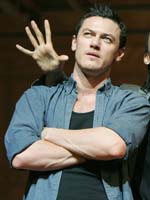The Jerwood Space in Union Street hosts the combined talents of Jamie Lloyd's latest directorial offering at the Donmar. Piaf, the play by Pam Gems which demonstrated the star quality of Jane Lapotaire in the 1970s is being revived, this time starring the Critics' Award-winning actress, Elena Roger.

One of its company, the youthful Luke Evans, bounds up to greet me during a break in rehearsals. He explains how, after two more weeks rehearsal and a 'very swift" technical, Piaf will open. "It has to be a quick technical because there's no room for big sets. No scene dock means all the set and props have to be manoeuvred up staircases to the stage." The amazing set designs at the Donmar will, from now on, seem even more amazing to this hardened reviewer.
Luke Evans is already an established feature of the Donmar, having played Vincent in the acclaimed Peter Gill production of Small Change. Now, Evans is set for some even bigger changes as he adopts several pivotal characters in the career of the enigmatic Piaf.
Evans explains how the first of these roles, Piaf's first mentor Raymond, is the man who "taught Piaf everything -- how to present the lyrics -- the legendary look, you know, the little black dress -- even her gestures." With obvious glee, Evans adds that he sees Raymond as "a neurotic anal character" who "channelled all his passion into [Piaf] -- even showing her how to use a knife and fork!"
As if in "juxtaposition" to the anally retentive Raymond, Evans also plays Yves Montand. Discovered by Piaf and ten years her junior, Montand's sexually-charged relationship with the little sparrow ensured that he too became a huge French star. Finally, Evans also plays the murderer Jean, although there are a number of other costume changes for "numerous other characters," including a Nazi German. Lloyd is certainly keeping this company member on his toes.
Not that Luke Evans has any fear of the music or the drama. "I am bringing my Welsh passion for music to the production," Evans explains. "Not only is there great ensemble singing," he adds, "but I also get to sing two songs solo." Evans notes that it has been some time since he sang professionally. Gill's Small Change was an acting part and so it is good now to "stretch" his vocal chords.
I ask if Evans sees any similarity between the Welsh and the French mentality towards singing and singers. "Definitely," he replies, "especially the way the French appreciate someone for their singing. Look at Piaf in concert -- no set, no costumes, just that glorious voice. It's the same with the Welsh. We appreciate people like Shirley Bassey and Tom Jones -- appreciate the simple talent of their voices." As if to stress his Welsh credentials, Evans describes his own journeys home as inevitably leading to him being asked to sing for his supper.
'Home' for Evans is Aberbargoed in the Rhymney Valley. Helpfully, he situates Aberbargoed as twenty miles north of Cardiff. It was here he grew up and here he developed his passion for performance. "I always knew I was going on the stage," Evans muses, "even though none of my family had any skill in that field." Displaying his keen determination, Evans adds that he "always wanted to act. When I was sixteen, my teacher entered me for a competition and I won a three-year scholarship at drama school. I graduated when I was twenty and then spent the rest of my adult life here in London. It's been nearly fourteen years now." It doesn't take a mathematician to work out that Evans is in his thirties, but his charming manner and looks take years off this young actor.
Nevertheless, and despite the years he has remained in London, he is "still quite proud of my Welsh background." Noting that there is no bar to a regional accent these days, Evans sees the only important thing for an actor is to be able to lose that accent when and if the situation requires it.
More importantly for Evans is the sense that he, rarely for British performers, has managed to cross the pigeon-holed boundary of musical performer and actor. "There's a definite distinction between musical performers and actors in this country, so much more here than in America. I feel very lucky to have had a chance to prove to my contemporaries not just that I am a singer, but that I can act too." Obviously eager to impress his peers, Evans explains how he believes that "people shouldn't be categorized -- anyway, talented people will always slip between the net." Now Evans has proved his credentials as an actor he admits that "doors have certainly opened for me."
There is a real sense that here is an actor whose musical background makes him unusually suited to the passionate story of Edith Piaf. As for the production, Evans describes Piaf as "filmic and dynamic" and, even more intriguingly, as "one hundred percent visually orgasmic." Piaf by Pam Gems is already a legendary piece. Piaf is herself a legend and, with raw talent like Luke Evans's to support this latest Donmar production, it certainly looks set to be 'orgasmic' in its execution.
Kevin Quarmby © 2008
|
